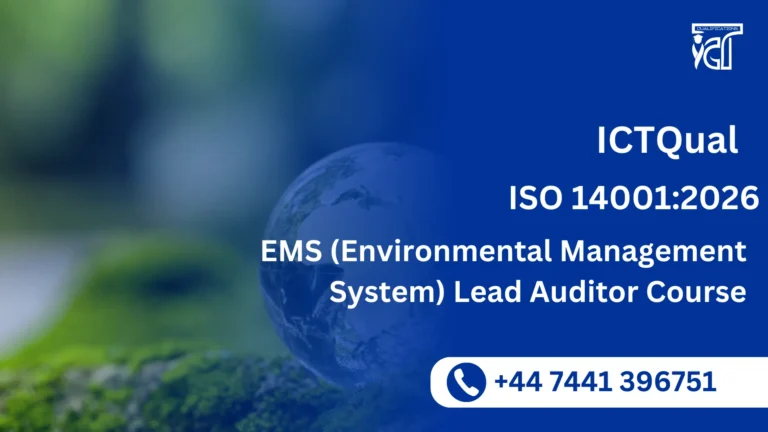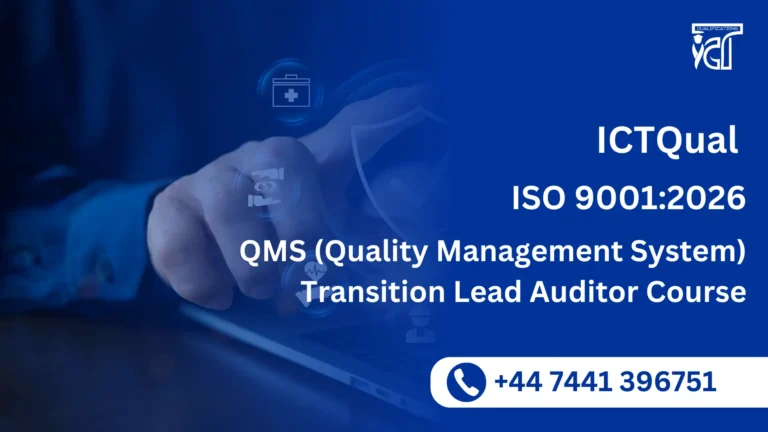The ICTQual AB Level 6 International Diploma in Supply Chain Management & Logistics is a comprehensive programme designed to equip learners with advanced knowledge and practical expertise in managing supply chains, logistics operations, and global trade processes. Spanning a three-year duration with a 360-credit structure, this diploma is ideal for both freshers seeking a strong foundation in supply chain management and professionals aiming to enhance their career prospects, take on managerial roles, or specialise in logistics and operational strategy.
Learners will develop essential skills in procurement, inventory management, transportation, warehousing, and supply chain analytics. The ICTQual AB Level 6 International Diploma in Supply Chain Management & Logistics emphasises both theoretical knowledge and applied learning, enabling learners to optimise operational efficiency, manage risk, and implement sustainable supply chain strategies. By fostering analytical, decision-making, and leadership capabilities, learners are prepared to meet the complex demands of modern logistics and supply chain management in a global business environment.
Upon completion, learners can explore a wide range of career opportunities in manufacturing, retail, transportation, logistics consultancy, and multinational organisations. The diploma also provides a solid foundation for those pursuing higher studies, specialisation in supply chain strategy, or leadership roles in operations management.
Key benefits of the programme include a structured learning journey that develops practical and strategic competencies, exposure to current industry trends, and preparation for leadership, advisory, and operational roles. Learners gain professional credibility, hands-on expertise, and the confidence to make informed decisions that drive organisational success.
This programme is tailored for learners committed to excelling in supply chain and logistics management, whether embarking on a new career or elevating existing professional experience, providing the knowledge, skills, and practical insight required to thrive in today’s competitive global supply chain environment.
ICTQual AB Level 6 International Diploma in Supply Chain Management & Logistics
This qualification, the ICTQual AB Level 6 International Diploma in Supply Chain Management & Logistics, consists of 36 mandatory units.
Year 1 – Foundation in Supply Chain Management & Logistics
- Introduction to Supply Chain Management
- Fundamentals of Logistics Operations
- Principles of Procurement and Sourcing
- Inventory and Warehouse Management
- Transportation and Distribution Management
- Business and Organisational Fundamentals
- Introduction to International Trade
- Supply Chain Technology and Systems
- Communication and Negotiation Skills in Logistics
- Introduction to Project Management
- Research Methods in Supply Chain Management
- Professional Ethics and Corporate Responsibility
Year 2 – Intermediate Supply Chain Management & Logistics
- Strategic Supply Chain Planning
- Advanced Procurement and Supplier Management
- Operations and Production Planning
- Risk Management in Supply Chains
- Quality Management and Compliance
- Global Trade and Customs Management
- Lean and Agile Supply Chain Techniques
- Logistics Information Systems (LIS)
- Leadership and Team Development
- Data Analysis and Performance Measurement
- Sustainability and Green Logistics
- Professional Development and Reflective Practice
Year 3 – Advanced Supply Chain Management & Logistics
- Global Supply Chain Strategy and Management
- Supply Chain Finance and Cost Control
- Advanced Logistics and Transportation Management
- Strategic Sourcing and Contract Management
- Supply Chain Analytics and Decision-Making
- International Supply Chain and Trade Law
- Innovation and Technology in Logistics
- Risk Assessment and Crisis Management
- Leadership in Supply Chain Organisations
- Project Management for Global Operations
- Research and Evidence-Based Practice in Supply Chain
- Capstone Project in Supply Chain Management & Logistics
Learning Outcomes for the ICTQual AB Level 6 International Diploma in Supply Chain Management & Logistics:
Year 1 – Foundation in Supply Chain Management & Logistics
Introduction to Supply Chain Management
- Understand fundamental concepts of supply chains, their components, and value creation.
- Analyse the role of supply chain management in organisational performance.
- Identify key stakeholders and supply chain networks.
- Develop awareness of global supply chain trends and challenges.
Fundamentals of Logistics Operations
- Explore principles of logistics and operational management.
- Understand transportation, warehousing, and inventory processes.
- Evaluate logistics processes for efficiency and service improvement.
- Apply operational strategies to real-world scenarios.
Principles of Procurement and Sourcing
- Understand procurement processes and supplier selection strategies.
- Develop skills to negotiate and manage supplier relationships.
- Analyse cost, quality, and risk factors in sourcing decisions.
- Apply ethical and sustainable procurement practices.
Inventory and Warehouse Management
- Acquire knowledge of inventory control systems and warehouse operations.
- Implement techniques to optimise stock levels and reduce costs.
- Evaluate warehouse layout, storage, and handling practices.
- Use inventory data to support decision-making.
Transportation and Distribution Management
- Understand transportation modes and distribution networks.
- Develop strategies for efficient routing and scheduling.
- Evaluate transport costs, risks, and service performance.
- Apply principles of last-mile delivery and reverse logistics.
Business and Organisational Fundamentals
- Understand organisational structures, cultures, and processes.
- Analyse business operations and their impact on supply chain performance.
- Apply management principles to operational planning.
- Evaluate organisational strategies to improve efficiency.
Introduction to International Trade
- Understand global trade principles and practices.
- Analyse import-export processes and trade documentation.
- Identify key international trade regulations and compliance requirements.
- Apply knowledge of international markets to supply chain decisions.
Supply Chain Technology and Systems
- Explore technologies used in supply chain management.
- Understand software tools for inventory, procurement, and logistics.
- Apply digital solutions to optimise operations.
- Evaluate technology’s role in efficiency and data accuracy.
Communication and Negotiation Skills in Logistics
- Develop effective communication strategies within supply chains.
- Apply negotiation techniques to supplier and stakeholder interactions.
- Enhance interpersonal skills for collaborative decision-making.
- Demonstrate professional communication in operational contexts.
Introduction to Project Management
- Understand project management principles and methodologies.
- Plan, execute, and monitor small-scale supply chain projects.
- Apply risk assessment and resource allocation techniques.
- Evaluate project outcomes against objectives.
Research Methods in Supply Chain Management
- Develop foundational research skills for logistics and supply chains.
- Design research projects, collect data, and analyse findings.
- Apply research insights to solve practical supply chain problems.
- Present research results in professional formats.
Professional Ethics and Corporate Responsibility
- Understand ethical principles in supply chain management.
- Analyse the impact of business decisions on society and the environment.
- Apply corporate social responsibility practices.
- Promote sustainability and ethical conduct within organisations.
Year 2 – Intermediate Supply Chain Management & Logistics
Strategic Supply Chain Planning
- Develop strategic planning skills for supply chain optimisation.
- Align supply chain strategy with organisational goals.
- Evaluate performance and implement improvements.
- Integrate planning tools and techniques into operations.
Advanced Procurement and Supplier Management
- Manage supplier relationships and contracts effectively.
- Develop sourcing strategies for long-term value creation.
- Analyse supplier performance and risks.
- Implement ethical and sustainable supplier management.
Operations and Production Planning
- Understand production scheduling and workflow optimisation.
- Apply capacity planning and resource allocation techniques.
- Analyse production efficiency and implement improvements.
- Use operational data for decision-making.
Risk Management in Supply Chains
- Identify risks in supply chain processes.
- Develop risk assessment and mitigation strategies.
- Implement contingency plans for operational disruptions.
- Evaluate risk management outcomes and refine approaches.
Quality Management and Compliance
- Understand quality standards and regulatory compliance.
- Apply quality assurance and control methods.
- Analyse compliance requirements for global trade.
- Monitor and report quality performance.
Global Trade and Customs Management
- Understand customs procedures, tariffs, and international regulations.
- Manage import-export compliance and documentation.
- Evaluate trade policies impacting global supply chains.
- Apply best practices for cross-border operations.
Lean and Agile Supply Chain Techniques
- Implement lean and agile methodologies to optimise supply chains.
- Analyse operational processes to eliminate waste.
- Apply flexible strategies to respond to market changes.
- Evaluate the impact of lean and agile practices.
Logistics Information Systems (LIS)
- Explore advanced information systems for logistics management.
- Use software tools to track shipments, inventory, and KPIs.
- Analyse data for operational decisions.
- Evaluate effectiveness of digital logistics solutions.
Leadership and Team Development
- Develop leadership skills for managing supply chain teams.
- Apply team-building techniques to enhance collaboration.
- Evaluate leadership styles and impact on performance.
- Foster a culture of accountability and improvement.
Data Analysis and Performance Measurement
- Analyse supply chain metrics and KPIs.
- Use statistical and analytical tools to identify trends.
- Make informed decisions based on data insights.
- Develop performance dashboards and reports.
Sustainability and Green Logistics
- Understand sustainable supply chain practices.
- Analyse environmental impact of logistics and procurement.
- Implement eco-friendly strategies to reduce carbon footprint.
- Promote sustainability initiatives in operations.
Professional Development and Reflective Practice
- Engage in continuous professional growth.
- Reflect on learning experiences to improve skills.
- Develop career strategies and professional competencies.
- Maintain professional conduct in supply chain roles.
Year 3 – Advanced Supply Chain Management & Logistics
Global Supply Chain Strategy and Management
- Design and implement global supply chain strategies.
- Analyse global market trends and competitive environments.
- Integrate cross-border operations efficiently.
- Evaluate strategic decisions using performance metrics.
Supply Chain Finance and Cost Control
- Understand financial management in supply chains.
- Analyse cost structures and optimise spending.
- Implement budgeting and cost-control measures.
- Evaluate financial performance of initiatives.
Advanced Logistics and Transportation Management
- Manage complex transportation networks and multimodal logistics.
- Optimise routing, scheduling, and freight operations.
- Analyse risks and implement mitigation strategies.
- Evaluate service levels and operational efficiency.
Strategic Sourcing and Contract Management
- Develop sourcing strategies aligned with organisational objectives.
- Manage contracts and supplier agreements effectively.
- Analyse supplier performance and risks.
- Implement ethical and sustainable sourcing practices.
Supply Chain Analytics and Decision-Making
- Apply advanced analytics for operational and strategic decisions.
- Use data-driven insights to optimise processes.
- Evaluate predictive models and scenario planning.
- Make informed recommendations to improve performance.
International Supply Chain and Trade Law
- Understand global trade laws and regulations.
- Analyse compliance requirements for international operations.
- Apply legal frameworks to contracts, procurement, and logistics.
- Evaluate impact of trade law on strategy.
Innovation and Technology in Logistics
- Explore emerging technologies in supply chain management.
- Evaluate digital solutions such as AI, IoT, and blockchain.
- Implement innovative tools for efficiency and transparency.
- Assess impact of technology on operational goals.
Risk Assessment and Crisis Management
- Develop advanced risk assessment and mitigation strategies.
- Manage supply chain disruptions effectively.
- Apply contingency planning and resilience frameworks.
- Evaluate effectiveness of interventions.
Leadership in Supply Chain Organisations
- Demonstrate leadership skills for complex environments.
- Manage teams, projects, and cross-functional operations.
- Foster organisational culture, accountability, and innovation.
- Evaluate leadership effectiveness and team performance.
Project Management for Global Operations
- Plan, execute, and monitor large-scale global projects.
- Apply project management tools to initiatives.
- Manage resources, timelines, and stakeholders.
- Assess project outcomes and implement lessons learned.
Research and Evidence-Based Practice in Supply Chain
- Conduct independent research in supply chain management.
- Analyse trends, innovations, and operational challenges.
- Apply evidence-based findings to improve processes.
- Present research outcomes in professional formats.
Capstone Project in Supply Chain Management & Logistics
- Integrate knowledge and skills from the full programme.
- Develop a substantial project addressing real-world supply chain challenges.
- Apply analytical, strategic, and operational competencies.
- Present professional recommendations and evaluate outcomes.
The ICTQual AB Level 6 International Diploma in Supply Chain Management & Logistics provides learners with extensive benefits that enhance both professional expertise and practical skills. By completing this programme, learners gain the knowledge, competencies, and confidence to manage complex supply chains effectively, optimise logistics operations, and contribute to organisational efficiency. The course ensures learners are fully prepared for diverse roles across industries and global supply chain environments.
1. Advanced Knowledge in Supply Chain & Logistics
- Comprehensive understanding of supply chain principles, logistics, and operational strategy.
- Insights into procurement, inventory management, transportation, and warehousing.
- Exposure to contemporary trends, tools, and technologies in supply chain management.
- Knowledge of risk management, sustainability, and ethical practices in logistics.
- Understanding of global trade regulations, compliance, and international logistics standards.
2. Professional Skill Development
- Enhanced analytical, problem-solving, and decision-making skills.
- Competence in supply chain planning, operational optimisation, and performance measurement.
- Ability to manage end-to-end logistics processes effectively.
- Development of leadership, communication, and team management skills.
- Practical skills in implementing innovative solutions and strategic supply chain initiatives.
3. Career Advancement Opportunities
- Eligibility for roles in logistics, supply chain management, procurement, and operations.
- Opportunities in manufacturing, retail, e-commerce, transportation, and consultancy sectors.
- Preparation for managerial and leadership positions within organisations.
- Pathway to specialisation in areas such as global supply chain strategy or logistics analytics.
- Enhanced employability and professional credibility in competitive international markets.
4. Global Perspective & Networking
- Understanding of international supply chain practices and cross-border logistics.
- Exposure to global standards, trade compliance, and multi-national operational strategies.
- Opportunities to network with industry professionals and supply chain experts worldwide.
- Awareness of cultural, regulatory, and economic factors impacting global supply chains.
- Development of a globally relevant professional outlook in supply chain management.
5. Practical & Transferable Skills
- Ability to conduct supply chain audits, forecasting, and inventory analysis.
- Project management and operational planning competencies.
- Adaptability to evolving technologies and logistics innovations.
- Transferable skills applicable across multiple industries and sectors.
- Preparation for continuous professional development and lifelong learning in supply chain management.
The ideal learner for the ICTQual AB Level 6 International Diploma in Supply Chain Management & Logistics is someone passionate about operations, logistics, and supply chain strategy. This programme is suitable for fresh learners seeking a solid foundation in supply chain management as well as professionals aiming to advance their careers, take on managerial roles, or specialise in logistics and operational strategy. Learners should be motivated, detail-oriented, and eager to develop analytical, strategic, and practical skills applicable in global business environments.
1. Aspiring Supply Chain Professionals
- Individuals seeking to start a career in logistics, procurement, or supply chain management.
- Learners interested in inventory management, transportation, and warehouse operations.
- Those aiming to develop analytical and operational management skills.
- Individuals preparing for further studies or certifications in supply chain management.
- Learners motivated to establish a professional foundation in logistics and operations.
2. Current Practitioners & Managers
- Professionals looking to enhance strategic supply chain and logistics knowledge.
- Those aiming to move into senior or managerial positions within operations departments.
- Learners seeking to optimise supply chain efficiency and improve organisational performance.
- Individuals responsible for procurement, planning, or distribution management.
- Those striving for professional recognition and credibility in supply chain management.
3. Fresh Graduates & Career Changers
- Recent graduates interested in entering the supply chain and logistics profession.
- Individuals transitioning from other fields seeking expertise in operations and logistics.
- Learners eager to gain practical and transferable skills for career readiness.
- Those looking for a structured, internationally recognised learning pathway.
- Individuals committed to building knowledge and confidence in supply chain management.
4. Global Supply Chain Enthusiasts
- Learners interested in international trade, cross-border logistics, and global operations.
- Professionals seeking knowledge of international supply chain standards and compliance.
- Individuals aiming to work in multinational organisations or global logistics teams.
- Those keen on networking with supply chain experts and understanding global operational challenges.
- Learners motivated to develop a globally relevant professional perspective.
5. Lifelong Learners & Skill Developers
- Individuals committed to continuous professional and personal growth.
- Learners passionate about operational efficiency, strategic planning, and supply chain optimisation.
- Those keen to enhance analytical, problem-solving, and decision-making skills.
- Professionals aiming to adapt to evolving industry trends and technological innovations.
- Learners seeking practical, transferable skills to thrive in diverse sectors and industries.
Completing the ICTQual AB Level 6 International Diploma in Supply Chain Management & Logistics equips learners with the knowledge, skills, and credibility to pursue advanced career opportunities, leadership roles, and specialised positions in logistics, supply chain, and operations management. The programme ensures learners are prepared to optimise processes, manage global supply chains, and contribute strategically to organisational success.
1. Operations & Supply Chain Management Roles
- Eligibility for managerial and senior positions in supply chain and logistics operations.
- Opportunities to lead procurement, inventory, and distribution management functions.
- Roles in planning, forecasting, and operational optimisation within organisations.
- Advancement to supply chain director or head of operations positions.
- Preparation for strategic decision-making and operational leadership responsibilities.
2. Logistics & Distribution Careers
- Roles in warehousing, transportation management, and logistics coordination.
- Opportunities in third-party logistics (3PL) and supply chain service providers.
- Engagement in route optimisation, freight management, and delivery systems.
- Specialisation in international logistics and cross-border distribution.
- Development of expertise for senior logistics consultancy and advisory roles.
3. Procurement & Sourcing Specialisation
- Careers in procurement, supplier management, and strategic sourcing.
- Roles in contract negotiation, vendor evaluation, and cost management.
- Opportunities to contribute to supplier development and risk management.
- Engagement in global sourcing and sustainable procurement initiatives.
- Preparation for leadership positions in procurement and supply chain strategy.
4. Higher Education & Academic Progression
- Pathway to postgraduate studies such as Master’s or MBA in Supply Chain Management, Logistics, or Operations.
- Specialisation in areas like global supply chain strategy, logistics analytics, or operations management.
- Opportunities for research, teaching, and scholarly publications.
- Access to international academic fellowships and study programmes.
- Strengthened credentials for professional and academic recognition.
5. Global & International Supply Chain Opportunities
- Careers in multinational organisations managing global supply chains.
- Roles in international trade, import/export, and cross-border logistics operations.
- Engagement with global supply chain networks and compliance standards.
- Opportunities in supply chain consultancy for international clients.
- Development of skills to manage diverse, geographically distributed operations.
As an approved centre of ICTQual AB, we provide learners with two structured pathways to achieve the Level 6 International Diploma in Supply Chain Management & Logistics.
Route 1: Experienced Professionals
- Eligibility: Learners must have at least six years of verifiable experience in supply chain management, logistics, procurement, or related fields.
- Focus: Advanced modules covering strategic supply chain management, operational optimisation, and global logistics.
- Benefits: Enhances leadership, analytical, and decision-making skills while building on existing professional expertise.
- Outcome: Prepares learners for senior supply chain, logistics, and managerial roles.
- Learning Approach: Streamlined programme recognising prior knowledge and experience.
Route 2: Fresh Learners
- Eligibility: Designed for learners new to supply chain management or logistics with limited professional experience.
- Focus: Structured learning through 36 assignments covering key supply chain principles, operations, and logistics management.
- Benefits: Builds foundational knowledge, practical skills, and confidence in supply chain management.
- Outcome: Prepares learners for entry-level and junior roles in logistics and supply chain departments.
- Learning Approach: Step-by-step guidance ensuring comprehensive skill and knowledge development.
Entry Requirements
To enrol in the ICTQual AB Level 6 International Diploma in Supply Chain Management & Logistics, learners must meet the following entry requirements to ensure readiness for the programme’s academic and professional demands:
Minimum Age
- Learners must be 18 years or older at the time of enrolment.
- Ensures maturity and readiness for advanced studies and professional engagement in supply chain and logistics.
Educational Background
- Completion of secondary education (high school) or an equivalent recognised qualification.
- Preferably, a Level 5 diploma or equivalent in supply chain management, logistics, business management, or related disciplines for advanced preparation.
- Fresh learners without prior diplomas can enrol via the assignment-based pathway.
Experience
- Route 1 (Experienced Professionals): Minimum six years of verifiable experience in supply chain management, logistics, procurement, or related sectors.
- Route 2 (Fresh Learners): No prior experience required; learners complete 36 structured assignments to gain core competencies.
Language Proficiency
- Learners must demonstrate proficiency in English, as the programme is delivered entirely in English.
- Acceptable evidence includes:
- Prior education in English
- IELTS score of 5.5 or above, or equivalent
- Other recognised English language certifications
- Strong written and verbal communication skills are essential for completing assignments and engaging in academic and practical discussions.
Register Now
Qualification Process
Qualification Process for the ICTQual AB Level 6 International Diploma in Supply Chain Management & Logistics
- Self-Assessment:
Begin by evaluating your eligibility to ensure you meet the qualification requirements, including work experience, knowledge, and language proficiency. - Registration:
Complete your registration by submitting the required documents, including a scanned copy of a valid ID, and paying the registration fee. - Induction:
An assessor will conduct an induction to confirm your eligibility for the course and explain the evidence requirements. If you do not meet the criteria, your registration will be cancelled, and the fee will be refunded. - Assignments & Evidence Submission:
Provide all assignments and the necessary evidence based on the assessment criteria outlined in the course. If you are unsure of the required evidence, consult with the assessor for guidance on the type and nature of evidence needed. - Feedback and Revision:
The assessor will review your submitted evidence and provide feedback. Evidence that meets the criteria will be marked as “Criteria Met,” while any gaps will be identified. You will be asked to revise and resubmit if needed. - Competence Evidence:
Submit final evidence demonstrating that all learning outcomes have been met. This evidence will be marked as “Criteria Met” by the assessor once it is satisfactory. - Internal Quality Assurance (IQA):
The Internal Quality Assurance Verifier (IQA) will review your evidence to ensure consistency, quality, and compliance with standards. - External Verification:
The IQA will submit your portfolio to ICTQUAL AB External Quality Assurance Verifiers (EQA) for final confirmation. The EQA may contact you directly to verify the authenticity of your evidence. - Certification:
Upon successful completion of all checks, ICTQUAL AB will issue your official certificate, confirming that you have attained the ICTQual AB Level 6 International Diploma in Supply Chain Management & Logistics.







